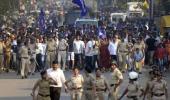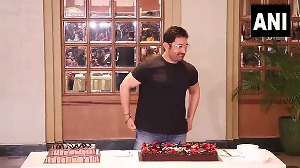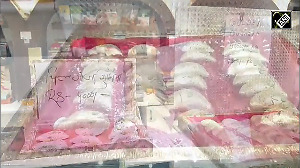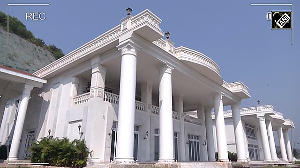The Supreme Court Wedunesday sought a response from the National Investigation Agency (NIA) on the bail plea of activist Gautam Navlakha in the alleged Elgar Parishad-Maoist links case.

A bench comprising Justices U U Lalit and K M Joseph issued notice to the probe agency on the plea of the activist against the Bombay High Court order of February 8 dismissing his bail plea.
Initially, the bench, which was hearing some other matter even after 4.30 pm, was of the view that the hearing on Navlakha's plea be fixed for consideration on Thursday.
However, senior advocate Kapil Sibal, appearing for the activist, said that he has been waiting for the case for few hours.
In the brief hearing conducted through video conferencing, the bench issued notice to NIA and sought its response by March 15.
According to police, some activists allegedly made inflammatory speeches and provocative statements at the Elgar Parishad meet in Pune on December 31, 2017, which triggered violence at Koregaon Bhima in the district the next day.
The police have also alleged that the event was backed by some Maoist groups.
The high court had said that 'it sees no reason to interfere with a special court's order which earlier rejected his bail plea'.
Navlakha had approached the high court last year, challenging the special NIA court's order of July 12, 2020 that rejected his plea for statutory bail.
On December 16 last year, the High Court bench reserved its verdict on the plea filed by Navlakha, seeking statutory or default bail on the ground that he had been in custody for over 90 days, but the prosecution failed to file a charge sheet in the case within this period.
The NIA had argued that his plea was not maintainable, and sought an extension of time to file the charge sheet.
The special court had then accepted NIA's plea seeking extension of 90 to 180 days to file the charge sheet against Navlakha and his co-accused, activist Dr Anand Teltumbde.
Navlakha's counsel had told the high court that the NIA was granted the extension to file its charge sheet.
Senior advocate Kapil Sibal had said Navlakha had already spent 93 days in custody, including 34 days of house arrest, and that the High Court must count house arrest as a period of custody.
While he was under house arrest, Navlakha's personal liberties remained curtailed, Sibal had said.
However, Additional Solicitor General S V Raju, who appeared for the NIA, had argued that Navlakha's house arrest could not be included in the time spent in the custody of police or NIA, or under judicial custody.
Raju argued that the Pune police arrested Navlakha in August 2018, but had not taken him into custody.
He said the accused remained under house arrest, and the Delhi High Court quashed his arrest and remand order in October 2018.
The FIR against him was re-registered in January 2020, and Navlakha surrendered before the NIA on April 14.
He spent 11 days in the NIA's custody till April 25, and since then he in judicial custody in the Taloja jail in neighbouring Navi Mumbai.
Raju had argued that if the court 'looked from the other angle, it would see that if he (Navlakha) was arrested on August 28, 2018, he should have been enlarged on bail'.
"He was a free man till April 2020. He was neither on bail nor in custody. There cannot be a gap in the custody and detention period," Raju had said.









 © 2025
© 2025